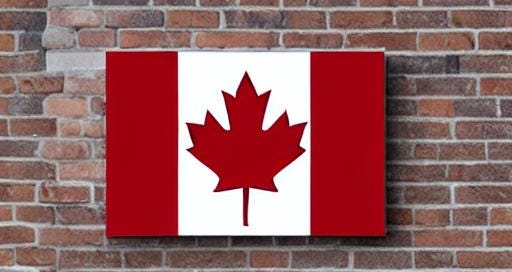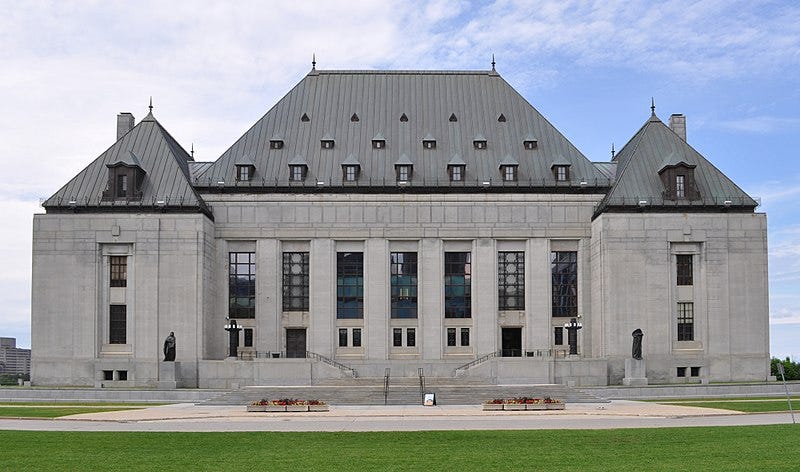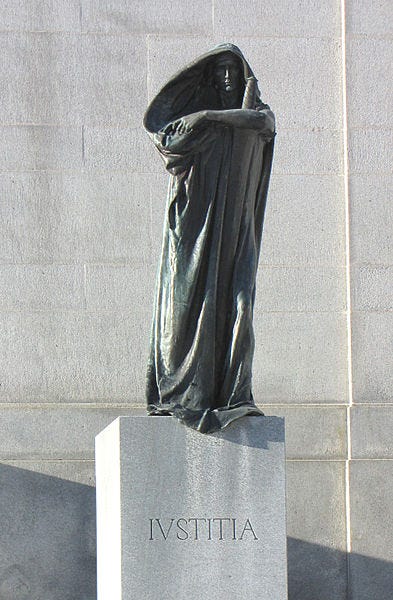Narration: Rahul Majumdar
Adapted from text originally published: July 21, 2023
The federal Official Languages Act update and the associated acts and amendments included in Bill C-13 are so far-reaching and perverse, they demand a fuller discussion than what has been offered to date by a compliant mainstream media.
As a result, I have created this four-part series, each focussed on a distinct theme:
Part 1: Top seven reasons for rejecting Bill C-13 outright, and acknowledgement of some voices of opposition prior to its June 20, 2023 Royal Assent.
Part 2: The Betrayal of English-speaking Quebec
Part 3: Justin Trudeau: Quebec Nationalism’s Most Effective Federal Asset?
Part 4, The Supreme Court of Canada’s Imminent Linguistic Politicization? considers potential ramifications for making bilingualism mandatory for Canada’s most important jurists.
The Supreme Court of Canada’s Imminent Linguistic Politicization?
Photo: Exterior of the Supreme Court of Canada Building. Credit: Dig deeper, CC BY 4.0, via Wikimedia Commons.
The Supreme Court of Canada according to its current Chief Justice, the Right Honourable Richard Wagner, PC, is the world’s only bilingual (English and French) and bijural (common law and civil law) supreme court. Since its creation in 1875, the Supreme Court of Canada has rendered landmark decisions affecting Canadians from all walks of life.
Up to now, Supreme Court of Canada nominations and appointments – whether originating from Liberal or Conservative governments – have mostly been discreet, without fanfare or controversy. Canadians have enjoyed the luxury of remaining blissfully unaware of the process, secure in the knowledge that the best candidates would be selected for the nine most important jobs in the Government of Canada’s judicial branch.
The Supreme Court of Canada nomination process has stood in stark contrast to that of the Supreme Court of the United States, where nominees are often polarizing figures, subject to hyper-partisan scrutiny in the U.S. Senate, and acrimonious media coverage for weeks on end prior to a final senate vote (or the candidate’s withdrawal).
However, Prime Minister Justin Trudeau’s 2016 overhaul of the Supreme Court of Canada appointment process to include functional bilingualism, and the updated Official Languages Act via Bill C-13 threaten to turn French fluency into a fault line for increasingly polarizing and politicized choices.
How bilingual must Bilingual Be?
As per C-13, Section 16 of the Official Languages Act will demand the following of Supreme Court of Canada applicants and/or judges:
A duty to understand proceedings without interpreters and adjudicate in both of Canada’s official languages;
Demonstrate the ability to offer equal access to justice in both official languages;
Indicate their skill level in both English and French;
Accept an evaluation of their language skills by the Office of the Commissioner for Federal Judicial Affairs;
Make use of language training opportunities for federal court judges
At 18% as of the 2021 census, Canada’s English-French bilingualism rate has held steady for a generation, above the 12-13% rate when the original Official Languages Act was introduced in 1969. However, the percentages remain heavily skewed towards Quebec and New Brunswick, and strongly favour francophones over anglophones and ethnic minorities throughout Canada – except in Quebec.
In this context, do these statistics justify disqualifying talented legal minds from the federal court system, including the Supreme Court of Canada, for not being bilingual enough to satisfy the Commissioner for Federal Judicial Affairs? Especially if language training is offered to Supreme Court of Canada judges?
Recall that Statistics Canada’s bilingualism threshold is the ability to conduct a casual, 10 to 15-minute conversation in both English and French. No mention is made of the conversation’s subject matter, let alone its degree of technical difficulty.
Effectively, the Government of Canada is telling future lawyers and jurists – as well as the 82% of Canada’s population who aren’t French-English bilingual today - that high-level legal scholarship and experience are secondary to passing a bilingualism test.
Does it make sense to deny Supreme Court of Canada judges interpretation technology services during proceedings, yet offer language training after the fact? Canada has among the best simultaneous French-English translators, translation services, and translation systems in the world. Surely an important tool that should be available to all Supreme Court of Canada judges, regardless of language ability in order to better perform their duties.
The technical nature of legal proceedings implies that even the most fluently bilingual Supreme Court of Canada judges may occasionally seek clarifications on terms, phrases, interpretations etc. in their weaker language. Perhaps even in their stronger official language. So, why the politicization of language at the Supreme Court of Canada?
Regional Representation on the Supreme Court of Canada Bench at Risk?
Since the advent of the nine-member Supreme Court of Canada in 1949, its composition has been set in law and by convention as follows:
Ontario – three judges;
Quebec – three judges, fixed by virtue of the Supreme Court Act;
Western Canada/Territories – two judges;
Atlantic Canada – one judge
However, C-13 puts the predictable, reliable, regionally-based model of Supreme Court of Canada appointments in jeopardy, and opens up a Pandora’s Box of claims from groups historically underrepresented at the Supreme Court of Canada.
Formalizing ‘Deux nations’ in Canada’s Judicial System?
By virtue of its civil law tradition, it’s been generally accepted that there should be three Quebec judges in the Supreme Court of Canada to ensure that critical expertise is available for judgments demanding such legal knowledge. Recently, the Government of Quebec has also been given a formal role in the selection/appointment of Supreme Court of Canada, Quebec Superior Court and Quebec Court of Appeal judges by the Trudeau government. Coupled with C-13, this gives French-speaking Canada (Quebec in particular) unprecedented influence at the highest levels of Canada’s judiciary.
Still, the passing of Bill 96, An Act respecting French, the official and common language of Québec has raised the ire of many in legal circles who deplore the Government of Quebec’s attempt to:
Impede English language use in provincial courts, contrary to Section 133 of the Constitution Act, 1867 and generally accepted access to justice principles;
Remove the requirement that Quebec judges to be bilingual with sufficient English fluency;
Require mandatory, certified French translations of English documents submitted for use in provincial court cases (suspended by an August 12, 2022 Quebec Superior Court ruling
The prospect of Quebec court system judges being unilingual French in the near future as the entire federal court system – Supreme Court of Canada included – becomes fully bilingual shouldn’t be lost on Canadians. Nor should the prospect of five – possibly six – First Official Language Spoken (FOLS) French Supreme Court of Canada judges, as the updated versions of both the Official Languages Act and Quebec’s Charter of the French Language take root.
BIPOC Backlash re. Supreme Court of Canada Bilingualism Requirements. Who’s Getting Left Out?
Retired Ontario Court of Appeal Justice Harry Laforme was the first Aboriginal person to sit on any appellate court in Canada in 2004.
Despite a stellar career and support from various legal groups, he knew that he’d never be considered for the Supreme Court of Canada:
You can't even put my name in front of the prime minister because I don't speak French. I feel sadness more than anything else because it always seems like … there's a new barrier being put in place to defend the inability to appoint an indigenous person.
~ Former Justice Harry Laforme, first Chair of the Truth and Reconciliation Commission of Canada[1]
Sadly, the new Supreme Court of Canada nomination criteria appears to be pitting mostly francophone lawyers, law students, and media intelligentsia against an emerging Black, Indigenous and Persons of Colour (BIPOC) legal community – especially the part based in English-speaking Canada.
With such a disparity in English-French bilingualism between various regions of Canada, does it really make sense to aggravate national tensions over the nomination and eventual appointment of a Supreme Court of Canada judge on average every two to three years?
Perhaps to avoid criticism from Indigenous nations and visible minority communities, Prime Minister Trudeau has made two notable Supreme Court of Canada nominations in the past two years:
The Honourable Mahmud Jamal from the Court of Appeal for Ontario in June 2021, the first person of colour to be nominated to Canada's top court;
The Honourable Michelle O'Bonsawin from the Ontario Superior Court of Justice in Ottawa in August 2022, the first Indigenous person to be nominated to Canada's top court
Both Jamal and O’Bonsawin are fluently bilingual, and now serve on the Supreme Court of Canada.
While the educational and other qualifications of these judges seem impeccable on the surface, do we risk compromising future Supreme Court of Canada appointments over the alleged decline of French and/or the latest Diversity, Equity, Inclusion (DEI) trends?
Do we risk freezing out the Harry Laformes of this world? A topic that may have to be revisited in the near future, evaluated after more Supreme Court of Canada judges are appointed with the new rules in place.
Conclusion
With C-13 now law, how long will it be before the bilingualism requirement for Supreme Court of Canada judges is challenged in court? Whether from a Western Canadian, BIPOC or meritocracy/scholarship perspective, the inherent unfairness of excluding over 80% of the country from the top rungs of the judiciary seems overtly unCanadian.
We ask for French-English bilingualism, with justification, for about 40% of federal civil service jobs, according to the latest numbers. Canadians seeking federal office and current politicians are certainly advised to be fluent in both languages. The rest of the federal court system is already subject to Official Languages Act bilingualism requirements.
However, when it comes to Canada’s highest court, making language a top consideration risks depriving the nation of its best candidates and heightening regional and linguistic tensions. Bilingualism and language fluency can serve as effective tiebreakers when evaluating high-level Supreme Court of Canada candidates, but they shouldn’t override legal scholarship and competency.
Merit, fairness and equality for all.
Photo: Justitia, outside the Supreme Court of Canada, Ottawa, Ontario, Canada. Credit: D. Gordon E. Robertson, CC BY-SA 3.0, via Wikimedia Commons.
[1] Olivia Stefanovich, (2021 Mar 31). Bilingualism requirement for Supreme Court of Canada justices creates 'needless barrier' for Indigenous candidates, critics say. https://www.cbc.ca/news/politics/supreme-court-proposed-official-languages-reform-1.5969707 Retrieved 2023 Jul 21.









Share this post